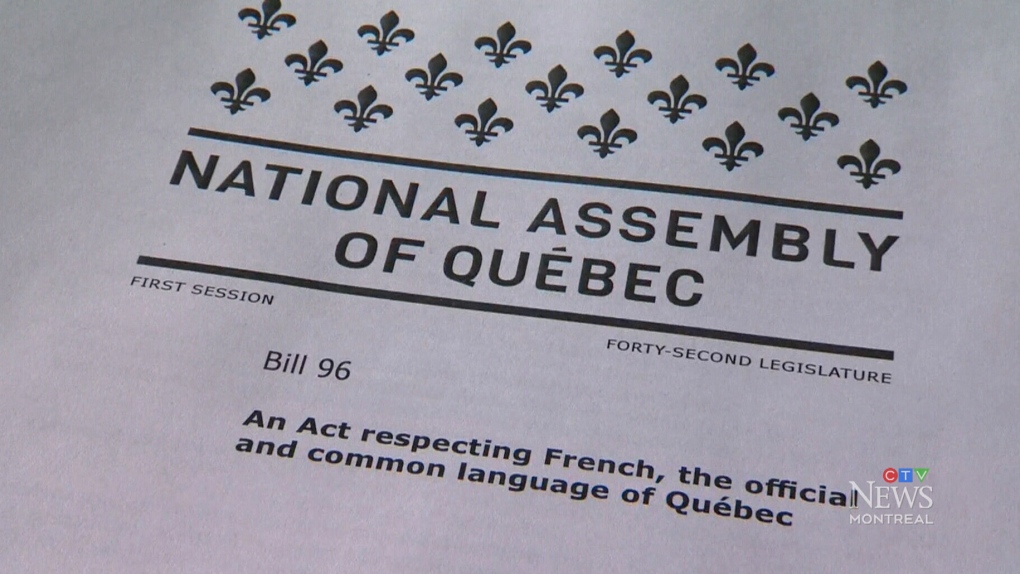5 changes in Quebec's Bill 96 that come into effect June 1
On June 1, 2022, Quebec’s Bill 96 became law, which brought sweeping changes to the Charter of the French language.
The controversial law, which limits the use of English in certain settings, was designed to protect the use of French in Quebec, but since it was passed it has prompted protests, court challenges, and concern from groups representing English-speaking Quebecers.
Parts of the new law will come into effect on June 1, the one-year anniversary of the bill receiving royal assent.
Here is a quick summary of some of the changes that are coming.
SERVICES FOR NEW IMMIGRANTS
New immigrants to Quebec will be given a grace period before provisions of Bill 96 — whose official name is An Act respecting French, the official and common language of Quebec — directly affect them. Beginning June 1, new immigrants must receive government services exclusively in French six months after their arrival in Quebec.
The government also warns people who are thinking of moving to Quebec permanently that their "knowledge of French will be taken into account in the selection process" and their French-language proficiency will be required for some immigration programs for those wishing to transition from temporary to permanent status.
One immigration lawyer told CTV News that new arrivals may not even have the chance to learn French in their first six months.
"There is a high likelihood that in the first six months, or close to six months, they aren't even able to get into French classes. So, this looks like a symbolic thing," said David Chalk.
"It looks like something that is more aimed at the electorate than it is at some sort of meaningful change in immigration policy."
COMPANIES TO DECLARE WORKERS' FRENCH SKILLS
Another big change: companies that have between five and 49 employees will have to start declaring the proportion of their workforce that is "unable to communicate in French." The proportion of a company's French-language proficiency will be made public in the business register.

The new rule applies not only to new companies, who must disclose this information in their declaration of registration, but also to existing companies when they do their annual update declaration, according to a notice published on April 27 on the Registraire des enterprises website.
The government defines being able to communicate in French as having the ability to perform tasks in French.
"Depending on an employee's job category and the tasks assigned to him, this ability can be assessed in the context of verbal or written exchanges with colleagues, superiors or customers," according to the government.
"Communicating in French implies, for example, having the ability to understand work instructions, to attend meetings, to take training, to write or share work documents (memos, reports, forms, etc.) and serve customers in French."
Jean-François Roberge, the minister responsible for the French language, said Quebec's language watchdog, the Office québécois de la langue française (OQLF), will help enterprises with this requirement.
 Eva Ludwig is the president of the Quebec Community Groups Network, which represents anglophones in Quebec. (CTV News)
Eva Ludwig is the president of the Quebec Community Groups Network, which represents anglophones in Quebec. (CTV News)
But the Quebec Community Groups Network (QCGN), an organization that advocates on behalf of English speakers, is concerned about the effect this might have on small businesses.
"What does adequate mean? Who evaluates it? This needs to be done on an annual basis. This is at a time when there is a labour shortage and it's already difficult to find employees," said Eva Ludwig, the QCGN's president, in an interview.
The Canadian Federation of Independent Business has also said it worries Bill 96 will create more of a burden on small businesses that are already struggling.
NEW PORTAL FOR LEARNING FRENCH
As of Thursday, anyone wishing to improve their French-language skills will be able to register with the government's new online portal. The Francization Québec portal will be available to new arrivals, future immigrants who want to learn French before their arrival in Quebec, workers and Quebec residents who don't speak French.
Quebec's minister of immigration, francization and integration, Christine Fréchette, announced the new portal Monday ahead of the June 1 deadline set by Bill 96.
"In 2017, the Auditor General had said that the organization of francization services was a real fiasco," Frechette said after announcing the initiative.
CERTAIN CONTRACTS MUST BE IN FRENCH FIRST
Bill 96 also changes how certain contracts are handled in Quebec. Starting on June 1, adhesion contracts (contracts that are drafted by a single party and are non-negotiable) can only be signed in a language other than French when a French version was also first presented. An example of adhesion contracts include insurance policies, terms of service, and franchise agreements.
Previously, it was standard practice to present a contract in English as long as there was a clause stating that the parties requested an English-only document, as noted by the business law firm McMillan, which operates in Montreal.
LANGUAGE OF CIVIL ADMINISTRATION
With the goal of promoting French, Bill 96 will require the civil administration to use French "in an exemplary manner," according to section 13.2 of act. This applies to government ministries and agencies, municipal organizations, health and social services organizations, and educational organizations, with some exceptions.
Exceptions include people eligible to receive education in English, Indigenous peoples, immigrants who have been in Quebec for less than six months, tourist services, and when the government is providing services outside of Quebec.
- Listen on CJAD 800: Mennie: How long before francophone businesses push back on Bill 96?
With files from CTV News Montreal's Amanda Kline
CTVNews.ca Top Stories

BREAKING Iran fires air defence batteries in provinces as explosions heard near Isfahan
Iran fired air defence batteries early Friday morning as explosions could be heard near a major air base near Isfahan, raising fears of a possible Israeli strike following Tehran's unprecedented drone-and-missile assault on the country.
American millionaire Jonathan Lehrer denied bail after being charged with killing Canadian couple
American millionaire Jonathan Lehrer, one of two men charged in the killings of a Canadian couple in Dominica, has been denied bail.
Nearly half of China's major cities are sinking, researchers say
Nearly half of China's major cities are suffering 'moderate to severe' levels of subsidence, putting millions at risk of flooding especially as sea levels rise.
Prince Harry formally confirms he is now a U.S. resident
Prince Harry, the son of King Charles III and fifth in line to the British throne, has formally confirmed he is now a U.S. resident.
Judge says 'no evidence fully supports' murder case against Umar Zameer as jury starts deliberations
The judge presiding over the trial of a man accused of fatally running over a Toronto police officer is telling jurors the possible verdicts they may reach based on the evidence in the case.
Health Canada to change sperm donor screening rules for men who have sex with men
Health Canada will change its longstanding policy restricting gay and bisexual men from donating to sperm banks in Canada, CTV News has learned. The federal health agency has adopted a revised directive removing the ban on gay, bisexual and other men who have sex with men, effective May 8.
Colin Jost names one celebrity who is great at hosting 'Saturday Night Live'
Colin Jost, who co-anchors Saturday Night Live's 'Weekend Update,' revealed who he thinks is one of the best hosts on the show.
Sports columnist apologizes for 'oafish' comments directed at Caitlin Clark. The controversy isn't over
A male columnist has apologized for a cringeworthy moment during former University of Iowa superstar and college basketball's highest scorer Caitlin Clark's first news conference as an Indiana Fever player.
'Shopaholic' author Sophie Kinsella reveals brain cancer diagnosis
Sophie Kinsella, the best-selling author behind the 'Shopaholic' book series, has revealed that she is receiving treatment for brain cancer.
































